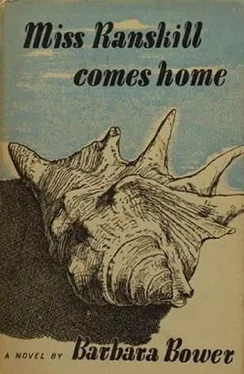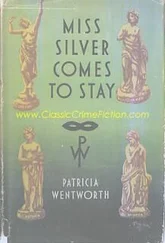I tell you this, Miss Ranskill, I tell you this, we might be a lot worse off than what we are here. Fancy trying to live anywhere else with nothing but what we’ve got here. We think now we’d be grateful for a roof over our heads, wait till we’ve got it and then see how we’ll clutter up the rooms. Wait till you see the shops, Miss Ranskill. You’re pleased with the powder-puff I made you, but it’ll only be fit for the dustbin by the time you’ve looked in one shop-window. Too much or not enough – that’s what it is all over the world and nobody knows when they’ve got enough, that’s how it is, Miss Ranskill.
A fidgeting in the carriage compelled her mind to return from its sea-lit voyage. The woman opposite was groping in her handbag. Since the beginning of the journey she had read a few pages from one book and a few from another, had written down one or two crossword puzzle clues and done several rows of knitting. Now she had lit a cigarette and was turning the contents of her handbag out on to her lap. There were two boxes of matches: those were still invaluable to Miss Ranskill’s eyes. There were two handkerchiefs, a cigarette-case, a lipstick, some orange sticks, a pocket-diary, a tiny mirror, a book of stamps, a railway ticket, an identity card, a powder compact and a letter.
Only the handkerchiefs and the matches would have been the slightest use to the Miss Ranskill of the Island. Only the handkerchiefs, the identity cards and (well, yes) the powder compact were much use to anyone in a railway carriage. Miss Ranskill was beginning to feel superior until a fluttering label attracted her and she remembered the kittens and the set of tools.
You’ve got to keep a sense of proportion, Miss Ranskill, there’d be nothing to laugh at else.
She too was a fool in the company of at least one other fool, and for the first time during the journey she felt the warmth of companionship.
The young airman in the far corner of the carriage was asleep. There were dark shadows under his eyes and his mouth was restless. It must be odd to him to be travelling like this. He and his kind were evolving slowly into a race apart. Engendered just before the last war, they were already incomprehensible and remote. They had seen what none but their generation could see – cities burning below them and the bowl of the stars above. The wings of Icarus melted when he was still young. What would happen to these men when the money they had been used to burn in the air was dissipated to other purposes? How would they, who had seen the ten-acre meadows as inch-wide patches for a county’s quilt with the warp and weft of streams and hedges no thicker than rows of stitching, keep the bounds of a counter in the years to come and employ their fingers to cut patterns of crêpe-de-Chine for customers?
Miss Ranskill remembered their fathers in the days after the last war. So many of them had journeyed through the valley of humiliation, worn smooth by the steps of commercial travellers; and had waited diffidently on doorsteps to sell vacuum cleaners and gimcrack gadgets. Fingers that had gripped joy-sticks had closed gratefully on the tips of war profiteers at petrol-filling stations.
To the young airman, asleep in his corner, the war must be a dream – half nightmare, half enchantment: perhaps even now he dreamed of the awakening.
The sailor beside the airman was leaning forward a little so that his view through the window was not interrupted. He was not such a puzzle to Miss Ranskill. She too had looked at the sea until her eyes had ached for the grey of a ship to break the greater grey of water, and her own eyes now showed the same network at the corners. He had the scoured look that makes every seaman ashore appear more immaculate than his civilian fellows. The unconfined muscles of his neck showed arrogantly above his collar and the straight line of his flannel. He was taking his fill of the land, but he looked rather bored by it. Suddenly Miss Ranskill remembered that in all her life she had never seen a sailor in a field. She wondered if there were any sea-superstition that banned meadows as unlucky, wondered what the sailor would reply if she asked him, imagined the astonishment of the other passengers supposing she did, and laughed out loud.
Now on a desert island one may laugh as freely and inconsequently as one chooses, and very slight things serve to amuse. The expression of a gull may remind one of a woman in the village at home, its gait and consequential air of someone about to open a bazaar. The astonished eyes of a crab may seem funny. Memory too plays such an important part in desert island life that one is ready and eager to be amused.
When we’ve given over remembering how to laugh, Miss Ranskill, we’ll be no better than the fishes. Many’s the time I’ve laughed out loud before you was washed ashore to cheer me up, and many’s the time I burst out laughing still even when I’m in one cove and you’re in another. Laughter’s the only thing that keeps one sane to my way of thinking.
A desert island is a more suitable place for laughter though than a railway carriage in England. Miss Ranskill realised this truth, as she was made self-conscious by the alarmed gaze of the woman opposite. The sailor found her more interesting than the meadows he had been watching. He turned to look at her, and his sudden movement awakened the airman, who blinked amazedly.
A three-year-old child, on its mother’s lap, pointed a sticky finger and demanded, ‘Do it again!’ The elderly civilian at her side coughed rather peevishly.
Some explanation seemed necessary. Since Miss Ranskill found it impossible to give one, and equally impossible to keep silence throughout such concern, she compromised by saying, ‘I do apologise!’ in a voice that was very much louder than she had meant it to be.
Instantly all the eyes, except those belonging to the small child, were averted from her. Had she been naked, she could not have been treated with such severe seemliness.
‘Do it again!’ repeated the child.
‘’Ush!’ said the mother. ‘Give over looking at the lady,’ and she dumped the child round on her lap until it shared the view through the carriage window with its embarrassed elders.
And now Miss Ranskill was very much alone, reproved and excommunicate from the society of her fellow-beings. She sought consolation by looking at the identity card, which did not do much to reassure her, though it should have assured any official that Ranskill Nona M/FURL/2388/2 was a British citizen and had a right to existence.
The child turned round to glance at her but was again twisted into position by its mother.
‘Miaou!’ said the little cat from the basket on the rack, ‘Miaou! Miaou!’
Once more the occupants of the carriage stirred to look at Miss Ranskill. Some peeped furtively, some glanced once and then away.
‘Do it again!’ cried the child.
‘Miaou! Miaou!’ repeated the cat obligingly.
The extremely perturbed face of the child’s mother suggested that she thought it bad manners to practise ventriloquism in a train.
Miss Ranskill sighed, as she stood up and took the basket from the rack.
From the moment she opened the lid she stopped being an alien. She and the little cat and the kittens became the most popular travellers.
‘Did you ever!’ said the mother of the baby. ‘What little dears!’
The sailor raised the chin of the black kitten with a forefinger until the milky eyes blinked at him.
‘We’d one the spit of this in the ship,’ he said. ‘It fell overboard off Gib – a bad day’s work that was. Might have been this little chap’s twin.’
The airman plucked the tortoiseshell from Miss Ranskill’s lap and laid it in the palm of his hand.
Читать дальше












